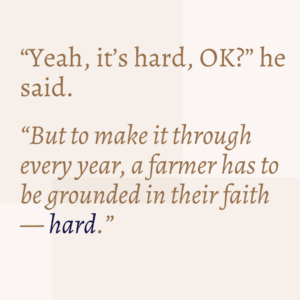Welcome to the June 30, 2023 issue of Cotton News, a service provided by Plains Cotton Growers Inc. for the cotton industry in the Texas High Plains and beyond.

Let’s Talk Mental Health in Agriculture
June is Men’s Mental Health Awareness Month. So I could write an article on mental health with research-backed findings on suicide rates among farmers. I could write about why farmers’ mental health is now a concern that’s gained traction in the health care industry. I could include tips and tricks to proactively maintain a healthy mental state.
But the truth is, I wouldn’t want to read that, and you probably don’t either. 
If you’re a farmer or work in the ag industry at all, you don’t need to be told why the mental struggle is real. It’s not a surprise to many of us in this industry why this is a topic the health care industry has been increasing its efforts toward.
Mental toughness only goes so far when you’re staring at a plummeting market price. It only goes so far when the land you care so much about hasn’t seen rain in 18 months. It only goes so far when the tools you need to do your job well increase in price by 150% to 300% — and no one’s there to take care of your overhead because you own the business. Mental strength doesn’t fix an ever-increasing inflation rate or interest rates at the bank — you already have a risky business on paper, let’s add inflation to it with bottom-of-the-barrel prices.
And I think the main problem with all of these problems is the fact that they are totally outside of the farmer’s control. The farmer doesn’t dictate the weather or set the commodity price. The farmer doesn’t control the economy, nor can he or she solely lower the risk of the operation.
Plus, every year is different. Even good years come with challenges that add to the uncertainty of the current crop or next year’s crop.
Last year was a bleak one for the Texas High Plains cotton industry. This year, while we’ve had some rain, is still a mixed bag. It’s hard to watch a $1.40 price in May 2022 dwindle to 79 cents in June 2023. It’s hard to watch a much-needed rain come with tragic tornadoes and baseball-size hail. And I haven’t even mentioned labor.
It’s just hard. But it’s not new.
I was talking to a farmer last year, back when prices were in the $1.40 range. He said it was hard to find motivation to start planting and ‘get going,’ because it was so dry. He didn’t think he would be able to make a crop, which was depressing in light of the best prices seen in decades. As he’s going through all of the challenges his operation was facing, I literally asked, “So, what keeps you from jumping off of a bridge?”
And his response was something that the health care gurus don’t really talk about.
“Yeah, it’s hard, OK?” he said. “But to make it through every year, a farmer has to be grounded in their faith — hard.”
Faith. That isn’t a popular topic when addressing mental health on a clinical level. And I’m not knocking clinical help or medication. We all deserve to be the best versions of ourselves, and counseling and medication are excellent tools when faced with insurmountable pressure. But I do believe faith should at least be part of the equation.
We all love the anonymous quote: “There is no greater demonstration of faith than a man planting seeds in a field.” Because all the factors outside of a farmer’s control rest in the hands of a higher power. 
Farming can also be isolating. Chances are you’re not around many people during the day. It can be easy to retreat socially during busy seasons. When we do get together, it’s not popular to tell the friend group that we’re struggling mentally. When farmers hang around other farmers, it’s usually to talk about farming — not the mental stress they’re facing alongside the farming.
Yet, it’s also common to hear people talk about how friendly the agricultural industry is — how neighborly we are. And it’s true. Farmers will help other farmers do just about anything. Check each other’s fields as they’re driving by, work on a pivot together, etc. So why not share each other’s mental burdens?
There are resources for everyone when it comes to taking care of mental health. Telemedicine has made huge waves in rural health care availability. If you need a counselor, you can download an app on your phone, pick one and do a session right from the tractor if you wanted to.
But wouldn’t it mean more if you could talk to someone who knows what you’re going through? Who is living it with you? Sometimes a good vent session is the healthiest thing you can do.
And while we’re being neighborly, let’s look out for each other. Check in with one another if you feel a friend has retreated mentally and/or physically. Because like it or not, the rate of suicide among farmers is 3.5 times higher than the general population. It’s an issue and we need to be observant.
And when it comes to observation, it’s typically not the ‘complainers’ you need to worry about.
It’s the ones who have stopped talking.
Let’s all do our part to keep the conversation going. Don’t dismiss mental health. It’s vital to our success both as farmers and human beings.
USDA Releases Planted Acreage Report
The U.S. Department of Agriculture National Agricultural Statistics Service (NASS) released its most recent planted acreage estimate June 30, 2023.
According to NASS, total cotton planted area for 2023 is estimated at 11.1 million acres, down 19% from last year. Upland area is estimated at 11 million acres, down 19% from 2022. American Pima area is estimated at 109,000 acres, down 40% from 2022.
Upland cotton planted acres for Texas are estimated to be 6.1 million acres, down from 7.8 million in 2022, but on par with the state’s historical average.
“Based on Texas’ planted acres estimate — although there are still several variables in play — the High Plains region acreage could see between 3.2 and 3.5 million acres, which is on track with our historical average planted acres,” said Kody Bessent, PCG CEO.
Cotton Industry Seeks Volunteer Leaders
The success of the High Plains cotton industry, like any group effort, is tied to the willingness of qualified individuals to volunteer to serve in various leadership positions.
PCG encourages all qualified producers interested in representing the Texas High Plains as a representative to the Cotton Board, National Cotton Council or Cotton Incorporated to call the PCG office for more information: 806-792-4904.
Qualified producer nominees should be actively engaged in the production of cotton at the time of nomination.
